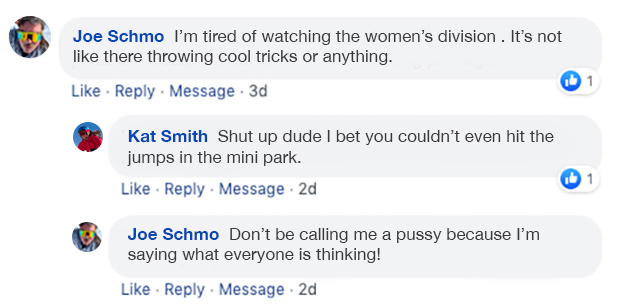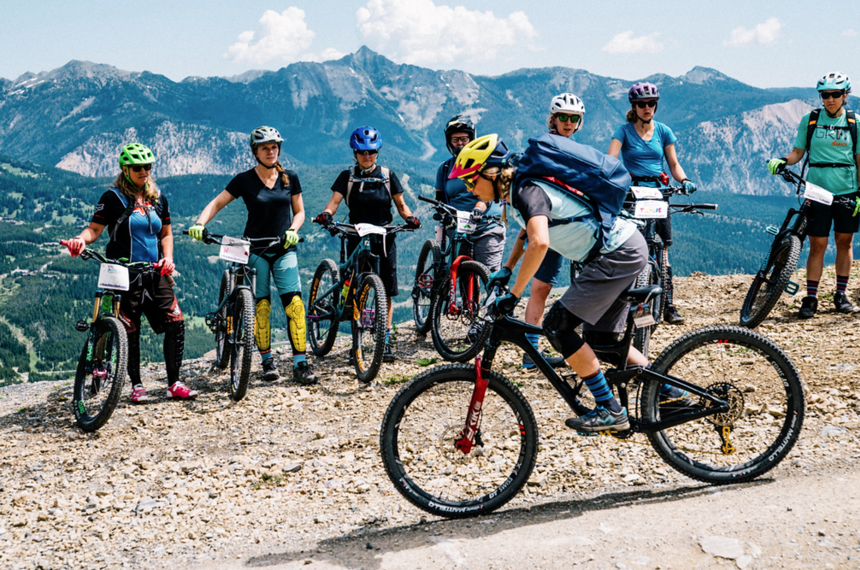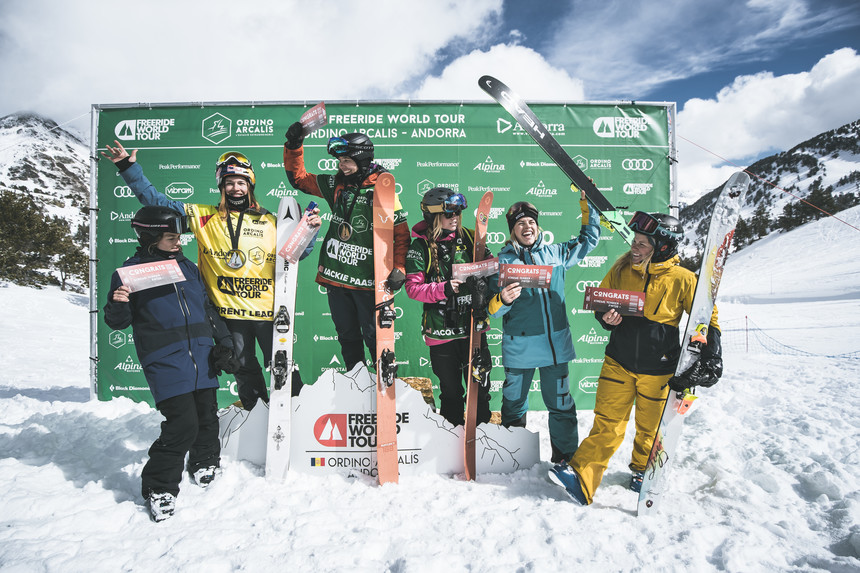Popular Stories

We see conversations like this far too often on our social channels. Words have power, even when they're being typed from a keyboard. TGR Mock Photo.
I wrote what should have remained a simple bike review for a publication that will remain anonymous. I sent the review in, and then it was edited and published with a tagline that I did not write. The tagline read “Ride Full-Suspension Like a Girl!” and was right below my name. I re-read it a few times to make sure I had read it correctly. In between the waves of the resultant loathing rooted in anger, frustration and embarrassment, the infamous insult tennis scene from Sandlot began to play out in my head:
“Moron!”
“Scab-eater.”
“Butt-sniffer!”
“Puss-licker!”
“Fart-Smeller!!” and his buddy takes a big whiff with a blissful grin.
“You eat dog-crap for breakfast, geek!”
“You make your Wheaties with your mamma’s toe-jam.”
“You bob for apples in the toilet, and you like it!”
“YOU, play ball LIKE A GIRL!”
Yes, this movie was written to take place in the ‘60s, and the point of this article is not to bash the film. The goal is to instead point out the history of the phrase "like a girl" when it comes to sports—particularly in the outdoor sports community which has notoriously struggled with gender equality.
“Play like a girl” is a historically derogatory phrase coined to tell a dude that he is not good enough to play at the level he strives for. Today, it is still used as an insult in the vernacular, although there are campaigns trying to shift that narrative. Think back a few years to the Always tampon commercial that aired during the Super Bowl. Their goal was to uncover how young women lose confidence at puberty, and in doing so, they also showed how tightly boys, girls, men, and women consider the phrase “Like a girl” as an insult aimed to describe a physical weakness.
This isn’t the only instance that feminine wording or association is used as an insult. Think of other seemingly innocuous phrases from our language. "Pull the sand out of your vagina" calls out a guy for being an annoying pussy. "Pussy", slang for vagina when used as a noun, is calling someone timid and weak when used as an adjective. Or, no, that one
MUST have been derived from the word pusillanimous and should be written as pusi right? But nope, unfortunately not the case.
"Let’s go balls out" means all in, 100%, put forth the effort to win. Thank God the phrase "dick move" is also a jab, there’s some parity, but then there’s grow a pair of balls, so you stop acting like a pussy. These phrases are just a few examples that demonstrate how our language tends to use male lingo as affirmation of strength, whereas female lingo is often linked to harsh undercuts that imply weakness.
This issue, unfortunately ubiquitous in the world, is distilled in sports.
Too many phrases, cheers and comments directed towards female athletes reinforce the criticisms and perceptions of “lesser-than.” This issue is not just one for the history books, it remains entangled in our present narrative. It seeps into our exchanges and perceptions along with criticism and scrutiny on women in athletics. Who could forget the undeniable sexism that permeated the
2016 and 2018 Olympic coverages? Say, for example, when five-time Olympic medalist Katie Ledecky was compared to her male teammates over and over, her stroke was even praised as being “like that of a man.” Patronizing language remains pervasive in action sports, and it can lead to often unintended self-doubt. The conspicuous and subtle gender bias that permeates our vernacular is so troubling because at the end of the day, words matter.
Here is what some of the world’s top action sports athletes have to say about how disparaging words of that nature left an unwelcome imprint with consequential impact.
Jackie Paaso, one of the most seasoned veterans on the Freeride World Tour, shares a story from 2008 during a FWT event at Snowbird. While scouting the course, she headed to the line that the previous winner took and was stoked, thinking, 'I can totally do that.' Yet, right before dropping in, she overheard two dudes behind her saying: "She can’t be thinking of skiing that! Dude, she’s probably lost."
Jackie has proved to be one of the boldest competitors on the FWT, always seeking lines that push her skiing.
Overhearing that exchange wigged Paaso to the extent that she took the easier and slower line in the preliminary ski to barely make it into the finals. Yet, knowing she could win and realizing that these comments had messed with her head, she skied the line she knew was in her command and sent it in the finals for the win, which earned her the exalted Sickbird Award.
Paige Alms, the big wave surfer who’s been one of the few inside of the hailed Mavericks barrel, is accoladed with World Championship wins and an advocate for equality between men and women in surfing. Despite her earned titles, Alms has faced blunt remarks about the innate inability of women when it comes to big wave surfing.
Join Our Newsletter
Alms recalls the vexing words broadcasted by the organizer of the Mavericks Big Wave Invitational who stated that girls were not good enough to surf those waves. “I was out there surfing Mavericks, with a pack of girls too,” Alms stated in response to that statement, “and then to hear [him] say, ‘Girls just aren’t good enough’ when it came to surfing the big waves riled me…That’s obviously not true! I surf Mavericks! We surf Mavericks.” This was back in 2008, when only men were invited to surf the Mavericks contests.
Alms, who rides those behemoth waves alongside a fierce crop of female peers, felt a mix of emotions, “first thinking it was funny because of how ridiculously untrue that comment was, especially when followed by clips of amazing female surfers charging big waves.” But that soon turned into the type of frustration that fuels action. Paige, a fearless pioneer of sport, exploits these negative remarks and keeps proving them to be wrong. “But to be honest, it just fuels the fire. I know what I’m capable of and what my friends are capable of, and proving people wrong really is gratifying!” Alms is one of the four women, alongside Bianca Valenti, Andrea Moller and Kealy Kennelly, who fought for a place for women in big wave contests.
Caroline Gleich, professional skier and mountaineer, was shocked by the statistic that only 10% of the Everest summiteers are women. This statistic ignited her to add one more woman to the list with the goal to be that visible hero to inspire more women to climb the big mountains. And, she didn’t let a snapped ACL stop her from reaching the top of the world.
Gleich brought up another common phrase that feels off-putting when people cheer with it: “Get it, girl!” This phrase becomes increasingly annoying when it ricochets into her ears while navigating through mellow sections of terrain.
What irked me about that phrase remained elusive until a conversation with Gleich. We thought about it, what does using that as a cheer really say? Because it feels like someone is almost making fun of you sometimes. It feels like they’re surprised to see a girl out there, instead of recognizing the raw display of athletic talent. We paused, and all of a sudden 80’s style hip hop filled the void, “Get, get, get, get, get, get it, gurrrrrl,” Gleich started rapping. “It also reminds me of that annoying song about some dude wanting to bang.”
Lindsey Richter, the engaging and inspiring founder of Ladies AllRide, is a woman who’ll get you laughing while slaying a feature beyond a skill level you didn’t know you had in your wheelhouse. She puts her actions where her heart, mouth and soul are as an active champion of getting more women on mountain bikes. “I started racing bikes in the ‘90s, and felt so out of place as I climbed the ranks. No race organizers were women. The pre-race meetings were never hosted by women. I couldn’t get my voice heard,” said the woman who can galvanize any large crowd with a tiny megaphone, “Even I couldn’t get my voice heard. There was a problem.”
Surrounded by men in training, racing and sponsorship she heard her slew of tasteless comments that, while adding some kindling for her spark, felt demoralizing at the same time. “But with phrasing, what really pisses me off is when someone attempts to compliment me by saying, ‘You’re pretty fast, for a girl!” ... The problem is not with the word “girl;” that word is not what bothers us post-pubescent female athletes, what is so frustrating about that phrase is that women are strong. “There’s no need to provide the caveat of gender,” Richter explained.
 Richter founded the Ladies AllRide mountain bike camps to inspire more women to ride. Katie Lozancich Photo.
Richter founded the Ladies AllRide mountain bike camps to inspire more women to ride. Katie Lozancich Photo.
These phrases together are offered as food for thought. I want to reiterate that the intention of this piece is not to reprimand, but instead to inspire folks to think a little harder about what may underlie their words.
In the instance of the tagline added to my review article, the publishers attempted to play with the phrase "like a girl" and mean, “see, like a girl means to shred.” Yet, it did not read that way to me, and it did not read that way to many other readers. I can see people reading it in many negative ways, such as, “Women riding mountain bikes is unusual!” “How cool, a woman who rides a mountain bike pretty well,” “Women on mountain bikes, no longer a travesty!” “Riding an E-Bike is like a girl, meaning, they do better with the motor!” Now is the time to welcome our female athletes and the next generation of girls, and it starts with our words.
But in reality, words are only one part of the equation. Beyond the things we say day to day, there are greater ways to celebrate and inspire women.
 Elevating women helps the industry as a whole, and it starts with empowering our female athletes. FWT Photo.
Elevating women helps the industry as a whole, and it starts with empowering our female athletes. FWT Photo.
We see professional leagues starting to address the issue of parity in announcers, prize money and reportage—the World Surf League announced in [only in] 2018 equal prize money would be awarded for men and women. The Freeride World Tour followed suit by implementing equal pay at the start of this year's tour. Crankworx is broadcasting the
Shifting Perspectives series as an authentic way to show that women shredding is not special, it is normal. Events and competitions are hosting an increasing percentage of women participants, and women are entering the industry’s public-facing roles that historically were reserved for men. And the next generation of shredders, climbers and rippers are getting revved up to conquer and perform through camps like the co-ed Junior Lifeguards, Girls do Ski camps and Specialized Little Bellas mountain bike camp.
In all truth, these issues extend beyond the bike and outdoor industries, which are still so far behind when it comes to parity in the conscious and subconscious. We can use this industry’s shifting spirit as an example to others—we’re far from perfect, but we’re making progress so let’s keep doing it! For women, for diversity in race, to diversity in gender, for diversity economic status, the list goes on because equality is for everyone, damnit.






